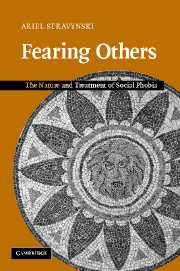Book contents
- Frontmatter
- Contents
- List of tables
- Acknowledgments
- Preface
- Part I What is Social Phobia?
- Part II What is The Nature of Social Phobia?
- Part III What Causes Social Phobia?
- 6 Social Phobia as a Consequence of Brain Defects with Graciela Pīneyro
- 7 Social Phobia as a Consequence of Cognitive Biases
- 8 Social Phobia as a Consequence of Inadequate Social Skills
- 9 Social Phobia as a Consequence of Individual History
- Part IV What Helps Social Phobic Individuals?
- Part V Concluding remarks
- References
- Author Index
- Index
7 - Social Phobia as a Consequence of Cognitive Biases
Published online by Cambridge University Press: 14 January 2010
- Frontmatter
- Contents
- List of tables
- Acknowledgments
- Preface
- Part I What is Social Phobia?
- Part II What is The Nature of Social Phobia?
- Part III What Causes Social Phobia?
- 6 Social Phobia as a Consequence of Brain Defects with Graciela Pīneyro
- 7 Social Phobia as a Consequence of Cognitive Biases
- 8 Social Phobia as a Consequence of Inadequate Social Skills
- 9 Social Phobia as a Consequence of Individual History
- Part IV What Helps Social Phobic Individuals?
- Part V Concluding remarks
- References
- Author Index
- Index
Summary
When encountering individuals complaining of social phobia one is rapidly disconcerted by the eerie strangeness of what they are saying about seemingly mundane events. A former military officer describes an oral examination at university as worse than going into battle. A landscape designer is convinced that an unsteady grip on a cup of coffee will give away how mentally unsound he is (“they'll think I'm a former alcoholic”). A few words of criticism addressed to a physiotherapist by a colleague are portrayed as “being slaughtered,” leaving her with only one way out: resigning. Which she did, explaining: “I could not face her again.”
Betraying disarray (e.g. losing one's train of thought) is viewed with great alarm. Admitting to being anxious is considered inconceivable as others are taken to be implacably stern judges bound to regard anyone with less than perfect poise – a disgraceful failure. Predictions of imminent doom are stated with great assurance: “I know I'll panic the moment I'll step into that room.”
The oddness of it all is compounded by the fact that the situations described (e.g. speaking in front of a group of people or courting someone) as well as the sentiments (e.g. trying to make a good impression while fearing a slip-up) are so familiar and common.
What could account for these individuals' peculiar outlooks? And what possible relationship does it have with the social phobic pattern of behavior?
- Type
- Chapter
- Information
- Fearing OthersThe Nature and Treatment of Social Phobia, pp. 184 - 224Publisher: Cambridge University PressPrint publication year: 2007



